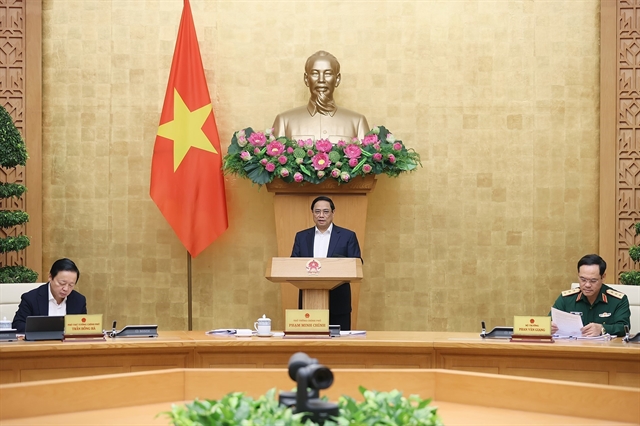 Politics & Law
Politics & Law


|
| Prime Minister Phạm Minh Chính chairs the Government’s thematic session on law building on Friday morning in Hà Nội.—VNA/VNS Photo Dương Giang |
HÀ NỘI — Prime Minister Phạm Minh Chính ordered relevant agencies to fix a delay in promulgating documents detailing the implementation of laws and ordinances, as well as to improve policy response capacity.
The order was made when Chính chaired the Government’s thematic session on law building on Friday morning in Hà Nội.
The session aimed to discuss proposals for the development of the Law on Amending and Supplementing a Number of Articles of the Law on Quality of Products and Goods; Law on Water Supply and Drainage; and Law on Electricity (amended).
Chính assigned the relevant agencies to complete, accelerate and improve the quality of building and promulgation of legal documents.
The Ministry of Justice was told to preside and coordinate with relevant ministries, sectors and localities to review the implementation of the Law on Promulgation of Legal Documents; give recommendations to complete the law-making process under the direction of Deputy Prime Minister Trần Lưu Quang; and urgently research and submit amendments to Decree 34/2016/NĐ-CP and Decree 154/2020/NĐ-CP detailing a number of articles and measures to implement the Law on Promulgation of Legal Documents, he said.
Other ministries and sectors were required to point out issues and contents that need to be added to the 2023 Law Building Programme and the 2024 Law Building Plan Programme, he added.
He requested the Government’s Office to urgently submit amendments to the Government's working regulations in the direction of speeding up the compilation and submission of draft legal documents; promoting the responsibility of leaders; clarifying the mechanism for handling and deciding on major issues with different opinions.
The ministries and sector must make more efforts and invest more resources in institutional work; supplement and improve the quality of officials and civil servants doing legal work; continue to realise and institutionalise the Party's new policies; develop regulations to remove current difficulties and obstacles to mobilise all resources for development; promptly supplement and complete regulations on practical situations; and coordinate closely with agencies of the National Assembly, he said.
He also said that building and perfecting institutions was one of three strategic breakthroughs identified by the Party and State.
Building and perfecting institutions was one of the key tasks, having a fundamental meaning, creating a legal framework to open up, liberate, mobilise, and effectively use all resources for rapid and sustainable socio-economic development, he said.
So far this year, the Government and the Prime Minister had always paid special attention to this work, especially reviewing and perfecting the law, removing bottlenecks, difficulties and obstacles, and creating favourable conditions for people and businesses, he said.
The Government organised eight thematic sessions on law building, he said.
The Government had also submitted to the National Assembly for consideration and approval many important laws having profound impacts on the entire nation’s socio-economic life. Along with that, the Government and Prime Minister issued 100 legal documents.
Proposals for 3 laws’ development
Also at the session, the Government heard the presiding agency present a summary of the proposal to develop the laws; collecting opinions of the ministries and sectors about preparation processes and procedures, as well as requirements and principles for developing the laws.
Regarding the proposal to develop the Law on Amending and Supplementing a Number of Articles of the Law on Quality of Products and Goods, Government members discussed identifying products and goods that can potentially be unsafe for customers, and quality inspection activities of products and goods; applying technology in quality management and traceability of products and goods; promoting deep international integration and fully implementing international commitments; and strengthening the role and performance of quality controllers.
Regarding the proposal to develop the Law on Water Supply and Drainage, the members discussed the synchronous, unified and effective development of water supply and drainage according to strategy and planning; management and operation of water supply and drainage systems; and ensuring resources for development of water supply and drainage.
Regarding the proposal to develop the Law on Electricity (amended), the members discussed developing renewable energy and new energy; completing regulations on conditions for electricity operations as well as issuance and revocation of electricity operation licences; managing electricity trading activities in the direction of promoting a transparent, fair, efficient and competitive electricity market, and electricity prices according to market mechanisms; and ensuring safety of dams and hydroelectric reservoirs during the construction and operation of hydroelectric projects. — VNS




